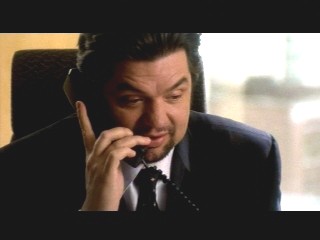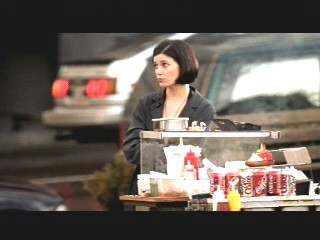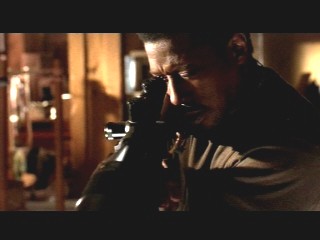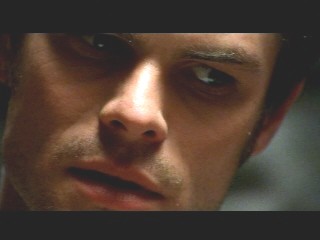
|
|
|
|
|
|
|
|
|
|
|
|
|
(2002) Director: Kari Skogland
I was afraid that sooner or later I'd get a movie like
this. To cut to the chase, Liberty Stands Still is a gun
movie. No, not one of those ode to joys that involve using guns to
their maximum destructive force for maximum entertainment value, a la
Boondock Saints. Instead,
it's a movie about guns. No, unfortunately it doesn't concern
ninjas hacking and chopping Even if I had some room left over, and I was firmly on one side or another of the whole gun situation, it would be very difficult for me to connect my viewpoint with the one that's expressed the movie. That's because it's really hard to figure out just what side of the fence Liberty Stands Still stands with this situation. Oh, I guess it was originally intended as an anti-gun movie. For one thing, I can't offhand think of any serious-minded pro-gun movies, undoubtedly because the majority of filmmakers happen to be liberal. (Question to conservatives: Why have so few of you been interested in any part of the movie-making business for all these decades, especially since you keep expressing dislike for the liberal themes many of these movies have?) Though the movie's liberal roots are truly exposed by showing the conservative characters (and places of authority) as utterly corrupt to incredible degrees. Yet despite this, all this corruption comes across as (heh) potshots with no depth, no credibility. At the same time, arguments for the anti-gun side come across as hollow, or foolish to the point of backfiring - the little there are, that is. The movie seems remarkably dense on the true facts of the subject, on each side, and how it has deeply affected the United States for several centuries. It didn't really come as a surprise to me subsequently discovering the movie was in fact written and directed by a non-American, nor that Lions Gate Films ultimately added this movie to their growing list of movies they originally announced for theatrical release but ended up going straight to video. While Liberty Stands Still may be a failure as an examination of the gun culture of America - and happens to also be a failure in its simultaneous attempt to be a suspense-thriller of sorts - it still may be of use to aspiring directors as a reference guide showing what not to do. As a matter of fact, even directors who have already made a career for themselves will still find some useful tips, such as if they are required to shoot the movie in Canada in order to save costs. One such useful tip comes very early on in the movie: While Vancouver can be passed off as Seattle, and possibly Chicago or New York if you work extra hard to disguise it, there is no way you can pass it off as Los Angeles. (Related tip: The additional inclusion of stock footage shots of the real bright and sunbaked Los Angeles will just make things worse.) Yet the movie insists this tale takes place in Los Angeles despite the fact that the location has no bearing on the story, and could have easily been changed to a more plausible American metropolis. Remember what I said about the writer/director being non-American? Canadian, to be exact. (In fact, the movie was a Canadian-German co-production, possibly explaining why no one among the various producers or financiers saw something seriously wrong with the shooting location.) Anyway, despite all the wet streets and overcast skies
on this particular day in Los Angeles, things are soon going to turn
hot. It beings shortly after Back to the story: While still in the park, she gets a call from a stranger (Snipes) on her cell phone. Calling himself "Joe", the stranger quickly makes it clear from his unknown vantage point that he's got control over her. Not only is there a bomb in the hot dog cart, but he has one of her company's sniper rifles pointed at her, firing a shot near her that manages to convince her of that (though curiously, not to any of the considerable number of people near her.) While still talking to her on the phone, he points out a pair of leg cuffs attached to the cart, and forces her to cuff her leg to the cart. Hey, Liberty is now standing still, get it? Get it? Though as you have probably guessed by now, the title means a lot more than that. Subsequently, Joe starts revealing to her that he has a serious and personal beef with her evil gun company, how it is hurting people not just in America but around the world, blah blah blah. In other words, liberty is standing still because of all those guns out there, get it? Get it? With the power of her cell phone draining fast (and the bomb set to blow if the cell phone dies or goes out of range), Liberty is stuck and has to battle with words with her captor as chaos slowly builds around her while time is running out. An amazingly similar premise to Phone Booth, though in one of those coincidences that previously involved body-switching, underwater activity, or Christopher Columbus, both movies were actually made (and subsequently shelved for a considerable period) at the same time. I'll start my skewering of this movie by first looking
at its handling of the whole gun issue, only because I am so sick of
the subject that I want to get it over with as soon as possible. If the
movie was intended to have an Changing the focus entirely to the central characters brings up an additional problem. It isn't just that they have been demonized without credibility and to unbelievable levels. It's also that when it comes to displaying emotion or reactions to situations that we can at least partly identify with, we can't identify with how they respond. How would you react to being chained up to a bomb while a totally unpredictable man with a sniper rifle keeps a bead on you, occasionally firing a shot that lands inches away? Simple panic and tears may be the first answer that comes to mind, though it happens to be one of the most plausible. I could also believe anger and rage, which can come out of someone feeling helplessness and maybe feeling there's nothing to lose by trying to lash out at their tormentor. But except for a few brief moments of tears or shouting, Liberty acts surprisingly cool and passive - an unlikely reaction for a conservative woman that has apparently lead quite a sheltered and comfortable life for the most part. This character needs to be cold instead of cool, quick-witted and snappy instead of mildly annoyed; it's what Fiorentino is great at, so it's no surprise that she seems to be utterly bored playing this character. The character of Joe, after learning more about him and what he wants, needs to be an angry character as well, to not only be believable as an anguished individual but so we can have two fiery characters butting heads. Snipes is good at that kind of thing, but instead he's pushed into being soft-voiced and unemotional. No prize for guessing he comes across as bored as Fiorentino. As bland as these two characters are, at least
Fiorentino and Snipes can thank their lucky stars for their parts
avoiding the gross stupidity writer/director Kari Skogland gave just
about every other character, including those The verdict? Send it to the firing squad.
Check for availability on Amazon (VHS) See also: Seven Hours To Judgment, Sunchaser, Tomorrow Never Comes |
 everyone blocking
their way from their goal of stealing guns, a la American Ninja.
Yes, I just heard you now groaning out loud with what you realized how
this movie concerns itself with guns: a feature-length argument about
guns, the right to carry them, blah blah blah. Whether you are for or
against gun control, I suspect that you are by now sick and tired of
hearing about the subject. Being neither overly liberal or
conservative myself, I care even less. And that's the problem I
immediately face with a movie like Liberty Stands Still.
You see, it seems to be an unwritten law that with any movie that
concerns itself with the whole gun control thing, any critic reviewing
it must more or less shout out his whole opinion on the subject in the
first paragraph. Neither the left or right appeals to me; liberals like
Michael Moore have become far too screechy and in-your-face instead of
trying to find a reasonable tone, and conservatives like Charlton
Heston simply thump their law books (and often their Bibles as well)
without considering the possibilities their source materials may have
flaws or contradictions. So with the law of the critics, what am I to
do? Wait a minute - I just realized I'm reaching the end of this
paragraph, so with no room left, I'm off the hook.
everyone blocking
their way from their goal of stealing guns, a la American Ninja.
Yes, I just heard you now groaning out loud with what you realized how
this movie concerns itself with guns: a feature-length argument about
guns, the right to carry them, blah blah blah. Whether you are for or
against gun control, I suspect that you are by now sick and tired of
hearing about the subject. Being neither overly liberal or
conservative myself, I care even less. And that's the problem I
immediately face with a movie like Liberty Stands Still.
You see, it seems to be an unwritten law that with any movie that
concerns itself with the whole gun control thing, any critic reviewing
it must more or less shout out his whole opinion on the subject in the
first paragraph. Neither the left or right appeals to me; liberals like
Michael Moore have become far too screechy and in-your-face instead of
trying to find a reasonable tone, and conservatives like Charlton
Heston simply thump their law books (and often their Bibles as well)
without considering the possibilities their source materials may have
flaws or contradictions. So with the law of the critics, what am I to
do? Wait a minute - I just realized I'm reaching the end of this
paragraph, so with no room left, I'm off the hook. Liberty Wallace
(Fiorentino, The Last Seduction) flies in after a
business trip. In short notice, the movie makes it clear this is an
evil woman that needs to be put in her place. Although married to
Victor (Platt, of The West Wing) one of the other senior
executives at her business, she (gasp!) tells him over the phone she
won't be back home until he's at the dessert stage of an important
business dinner that night. That's because unknown to him, Liberty is
(slut!) having an affair with Russell (Martin Cummins, Dark Angel)
- and a purely sexual one at that. Would you also believe she's not
only a drug addict, but will immediately sneak a snort of what's she's
bought from the drug dealer working the hot dog cart in the busy city
park? Maybe not immediately, but I'm sure you will once I let you know
that to top this list of evil off, Liberty is the heiress to McCloud
Industries - one of the biggest gun manufacturers in the country. Yeah,
all this shows this woman (from a prominent Republican family, of
course) is eeee-villllll, and that a liberal wrote the
screenplay.
Liberty Wallace
(Fiorentino, The Last Seduction) flies in after a
business trip. In short notice, the movie makes it clear this is an
evil woman that needs to be put in her place. Although married to
Victor (Platt, of The West Wing) one of the other senior
executives at her business, she (gasp!) tells him over the phone she
won't be back home until he's at the dessert stage of an important
business dinner that night. That's because unknown to him, Liberty is
(slut!) having an affair with Russell (Martin Cummins, Dark Angel)
- and a purely sexual one at that. Would you also believe she's not
only a drug addict, but will immediately sneak a snort of what's she's
bought from the drug dealer working the hot dog cart in the busy city
park? Maybe not immediately, but I'm sure you will once I let you know
that to top this list of evil off, Liberty is the heiress to McCloud
Industries - one of the biggest gun manufacturers in the country. Yeah,
all this shows this woman (from a prominent Republican family, of
course) is eeee-villllll, and that a liberal wrote the
screenplay. anti-gun theme, it
utterly fails. It's one thing to demonize something that you are
against, but you are asking for trouble if there is no credibility in
the portrait you paint. As you probably sensed earlier, all those
negative attributes given to Fiorentino's character were laughable.
People who are successful in business tend to have placed the same
ethics in their personal life; these smears placed on Liberty's
character are not only unlikely, they comes across as a desperate way
to demonize. But it's not just Liberty who gets caught in the
mud-slinging; everyone authority figure mentioned in the movie, from
senators to the CIA, is shown to be involved in a conspiracy to keep
the arms industry chugging along in the country. While I'm not saying
this isn't possible, or that such things haven't
happened, the movie refuses to explore how or why such
things supposedly happen. So when Liberty is forced to confess about
senators that have been given "donations" in their Swiss bank accounts,
or when Joe tells Liberty he knows that a shipment of guns supposedly
to Poland actually went to the Serb and Croats, none of it convinces
us. It's far too easy to come up with conspiracy theories or claims; if
a movie wants to bring us to its point of view, it has to get as close
to reality as possible. Bring in established facts, make accurate
recreations, give us something tangible. Otherwise, don't waste
the audience's time, when making fiction could give us something
wonderful as, say, Boondock Saints.
anti-gun theme, it
utterly fails. It's one thing to demonize something that you are
against, but you are asking for trouble if there is no credibility in
the portrait you paint. As you probably sensed earlier, all those
negative attributes given to Fiorentino's character were laughable.
People who are successful in business tend to have placed the same
ethics in their personal life; these smears placed on Liberty's
character are not only unlikely, they comes across as a desperate way
to demonize. But it's not just Liberty who gets caught in the
mud-slinging; everyone authority figure mentioned in the movie, from
senators to the CIA, is shown to be involved in a conspiracy to keep
the arms industry chugging along in the country. While I'm not saying
this isn't possible, or that such things haven't
happened, the movie refuses to explore how or why such
things supposedly happen. So when Liberty is forced to confess about
senators that have been given "donations" in their Swiss bank accounts,
or when Joe tells Liberty he knows that a shipment of guns supposedly
to Poland actually went to the Serb and Croats, none of it convinces
us. It's far too easy to come up with conspiracy theories or claims; if
a movie wants to bring us to its point of view, it has to get as close
to reality as possible. Bring in established facts, make accurate
recreations, give us something tangible. Otherwise, don't waste
the audience's time, when making fiction could give us something
wonderful as, say, Boondock Saints. that just appear once
for only a very brief time. Actual citizens of L.A. would have good
cause to file a class-action lawsuit against her, because (among other
things) she makes them so stupid that (1) nobody passing Liberty can
see the humongous chain connecting her to the hot dog cart, (2) more
than one person thinks this well-dressed woman is the proprietor of the
hot dog cart, and (3) one customer looks at the large HELP she writes
with mustard on the bun, and exclaims, "I didn't want mustard!"
Skogland's proves equally hopeless helming the camera as well. There is
usually a threadbare feel to most scenes, possibly due to Snipes' and
Fiorentino's salaries eating up much of the movie's $11 million budget.
A great many scenes were undoubtedly set up and shot quickly, with the
actors tightly packed together and with the zoom lens set near or at
maximum, quite often resulting in only a portion of the actors' heads
being visible. You never get a good feel for whatever is happening at
any time. In fact, I felt nothing but boredom, when not feeling disgust
over some character's stupidity. There's no feeling of tension, no
feeling of enlightenment over the issue at hand, no feeling that even
the characters involved give a damn about what's going on.
that just appear once
for only a very brief time. Actual citizens of L.A. would have good
cause to file a class-action lawsuit against her, because (among other
things) she makes them so stupid that (1) nobody passing Liberty can
see the humongous chain connecting her to the hot dog cart, (2) more
than one person thinks this well-dressed woman is the proprietor of the
hot dog cart, and (3) one customer looks at the large HELP she writes
with mustard on the bun, and exclaims, "I didn't want mustard!"
Skogland's proves equally hopeless helming the camera as well. There is
usually a threadbare feel to most scenes, possibly due to Snipes' and
Fiorentino's salaries eating up much of the movie's $11 million budget.
A great many scenes were undoubtedly set up and shot quickly, with the
actors tightly packed together and with the zoom lens set near or at
maximum, quite often resulting in only a portion of the actors' heads
being visible. You never get a good feel for whatever is happening at
any time. In fact, I felt nothing but boredom, when not feeling disgust
over some character's stupidity. There's no feeling of tension, no
feeling of enlightenment over the issue at hand, no feeling that even
the characters involved give a damn about what's going on.